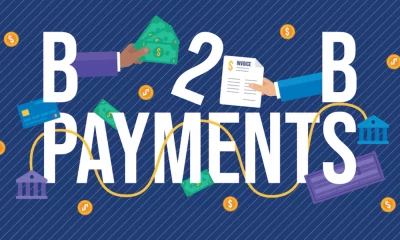Economy
Stanbic IBTC to Unlock Business Opportunities in AfCFTA for Clients

By Dipo Olowookere
Stanbic IBTC Bank Plc has promised to unlock business opportunities in the African Continental Free Trade Area (AfCFTA) agreement for its corporate and Small and Medium-sized Enterprises (SMEs) clients.
The chief executive of the financial institution, Mr Wole Adeniyi, while speaking at a webinar recently, explained that this would be done by leveraging the trade opportunities in the deal.
In 2018, countries on the continent came together to form a single market aimed to boost their respective economy, though it officially kicked off in January 2021 after a few postponements.
Nigeria signed the AfCFTA in 2019, after a year’s delay, and is considered the most recent country to ratify the agreement.
For Stanbic IBTC, a subsidiary of Standard Bank Group, Nigerian investors and business owners can tap into the initiative for their benefit.
Addressing participants at the event themed AfCFTA State of Play: Understanding Potential and Maximising Opportunities for the Customer, Mr Adeniyi stated that multiple studies have shown that the increase in trade has a direct impact on reducing unemployment and poverty in societies.
According to him, the AfCFTA agreement presents numerous trade opportunities that are both exciting and promising not just for the continent but for the Nigerian market.
Another speaker, Mr Bamidele Ayemibo, a lead consultant at 3T Impex Trade Academy, pointed out that with the implementation of the AfCFTA agreement, Africa has the opportunity of becoming the largest market in the world with a population of 1.2 billion people and a combined GDP of $3.4 trillion.
He emphasised that the goal of AfCFTA is to create a single market for Africa and encourage the free movement of goods and services thereby facilitating trade transactions.
Mr Ayemibo pointed out that Nigerian customers can take advantage of the non-sensitive list, the sensitive list and the exclusive list in the agreement while engaging in various trade transactions with other African countries.
According to him, out of about 5,000 AfCFTA codes or products in the world that fall under the non-sensitive list, 90 per cent are duty-free and Nigeria customers can take advantage of this.
He added that countries can liberalise their products under the sensitive list within a period of 10 years while the exclusive list enables countries not to liberalise their products in order to protect that sector of their economy.
Mr Ayemibo stressed that the Federal Government is currently developing a portal where Nigerian customers and investors can trade with other countries under the AfCFTA agreement.
He explained that AfCFTA presents a huge potential for Nigerian manufactured products on the African continent because Nigeria produces about 90 per cent of such products that are imported by other African countries.
While appreciating Stanbic IBTC for the bold step it has taken to educate its clients and investors about the benefits of AfCFTA, Mr Ayemibo added that information enables agreement such as the AfCFTA to thrive, lamenting that previous agreements like the ECOWAS Trade Liberalisation Scheme (ETLS) collapsed due to lack of adequate information.
He added that with its vast footprint across Africa through Standard Bank, Stanbic IBTC can reach out to its numerous customers and educate them on the benefits of the AfCTFA agreement.
Economy
Dangote Refinery Shares to be Available to Public in Five Months

By Adedapo Adesanya
The chairman of Dangote Group, Mr Aliko Dangote, has said that within the next five months, Nigerians should be able to purchase shares of Dangote Petroleum and Refinery.
Mr Dangote made this revelation on Sunday during a tour of the facility by the chief executive of the Nigerian National Petroleum Company (NNPC) Limited, Mr Bayo Ojulari, alongside members of the company’s executive management.
The $20 billion refinery is the largest single-train refinery in the world with 650,000 barrels per day refining capacity. There are efforts to boost the capacity to 1.4 million barrels per day soon.
Speaking with journalists, Mr Dangote said, “And the other issue is that they (NNPC) are holding 7.25 per cent of the shares that we have here, which is more than the shares Elon Musk has in Tesla. And they are holding that on behalf of Nigerians,” he said.
“So individually, Nigerians too will have an opportunity in the next, maybe a maximum of four to five months. There will actually be an opportunity to buy the shares.”
He added that shareholders will have the option to receive their dividends in either naira or dollars, as the refinery also earns in dollars.
Commenting on Mr Ojulari’s visit, the billionaire businessman said the NNPC, represented by Mr Ojulari and its management team, was not just a guest but a shareholder.
“Today is really our best day ever” at the facility. I know NNPC invested in us when we were not really sure whether the refinery would be successful.
“So that’s the kind of level of confidence. But right now, the relationship with the new set of people that we have at NNPC, I think the sky is the limit, and we will cooperate and also make sure that we work together to make sure that we make Nigerians proud.”
Speaking on prospects of partnership with NNPC in the upstream sector, he said, “We have block 71, 72, but we’re going to look much deeper”.
“Most likely, depending on our own discussions with them, we will partner with them, maybe in some of the upstream. They, too, will partner with us here because here is not just a refinery, it’s an industrial hub.
“And that’s why we’re doing linear alkaline benzene, which is a raw material for detergents, ” he added.
Economy
NGX Investigates Zichis Stocks After 859% Rise in One Month

By Aduragbemi Omiyale
The Nigerian Exchange (NGX) Limited has launched an investigation into trading activities on the shares of Zichis Agro-Allied Industries Plc.
A notice from Customs Street on Monday disclosed that this has led to the suspension of the company for now.
This development comes about a month after Zichis was listed on the domestic bourse and placed in the growth board of the NGX.
In the circular, it was disclosed that the suspension may be lifted after the conclusion of the findings, but for now, investors will not be able to trade the organisation’s securities on the NGX platform.
“The suspension of trading in Zichis shares shall be lifted upon the conclusion of an investigation into the trading activities on the company’s shares,” a part of the disclosure stated.
The bourse explained that it wielded the big stick on Zichis in compliance with Rule 7.0, Rules on Suspension of Trading in Listed Securities, Rulebook of The Exchange (Issuers’ Rules).
This part of the law states that, “Notwithstanding any of the foregoing provisions, the exchange may, in accordance with any of its rules, place the trading of any security on suspension.
“It may also do so if it is of the view that such suspension will be in the interest of the investing public and in accordance with the SEC Rules.”
In announcing the action on the firm, the NGX declared that, “The shares of Zichis Agro-Allied Industries Plc have been suspended from trading on the facilities of Nigerian Exchange Limited (NGX), effective today, Monday, February 23, 2026.”
Business Post reports that last week, shares of Zichis appreciated by 60.74 per cent to N17.36. It joined the stock exchange at N1.81, indicating it has gained N15.55 or 859.12 per cent in one month.
Economy
Nigeria Investment Fund, Japan Unveil $50m Innovation Fund for Startups

By Adedapo Adesanya
The Nigeria Investment Authority (NSIA) and Japan International Cooperation Agency (JICA) have finalised agreements to launch a $50 Sovereignmillion impact innovation fund aimed at strengthening the Nigerian start-up ecosystem.
The fund is expected to provide patient capital to pre-seed, seed, and early-stage startups addressing critical social challenges in sectors such as agriculture, healthcare, education, energy, waste and water management.
JICA will provide $14 million in grant support, while NSIA contributes up to $20 million to match the grant.
Structured as an onshore public fund, the initiative combines financial support with technical assistance to help startups refine products, scale operations, and expand into new markets.
The fund is expected to create jobs, improve livelihoods, and contribute to sustainable economic development across Nigeria.
Speaking at the agreement signing ceremony between NSIA and JICA at the Ministry of Budget and Economic Planning, Mr Aminu Umar-Sadiq, the chief executive of NSIA, said: “The Fund represents a transformative step for Nigeria’s startup ecosystem. By providing early-stage ventures in high-impact sectors with the capital and support they need to grow, we are enabling innovators to tackle some of Nigeria’s most pressing challenges. Our collaboration with JICA underscores our commitment to entrepreneurship, inclusive growth, and sustainable development.”
Preparations are underway to operationalise the Fund and develop a pipeline of high-impact startups ready for investment. NSIA remains committed to advancing socio-economic development through strategic partnerships that scale impact, expand innovative solutions, and unlock access to capital.
On his part, the Japanese Ambassador to Nigeria, Mr Suzuki Hideo, said, “The Government of Japan hopes this new project will take root in Nigeria and bear fruit swiftly.”
-

 Feature/OPED6 years ago
Feature/OPED6 years agoDavos was Different this year
-
Travel/Tourism10 years ago
Lagos Seals Western Lodge Hotel In Ikorodu
-

 Showbiz3 years ago
Showbiz3 years agoEstranged Lover Releases Videos of Empress Njamah Bathing
-

 Banking8 years ago
Banking8 years agoSort Codes of GTBank Branches in Nigeria
-

 Economy3 years ago
Economy3 years agoSubsidy Removal: CNG at N130 Per Litre Cheaper Than Petrol—IPMAN
-

 Banking3 years ago
Banking3 years agoSort Codes of UBA Branches in Nigeria
-

 Banking3 years ago
Banking3 years agoFirst Bank Announces Planned Downtime
-

 Sports3 years ago
Sports3 years agoHighest Paid Nigerian Footballer – How Much Do Nigerian Footballers Earn






















